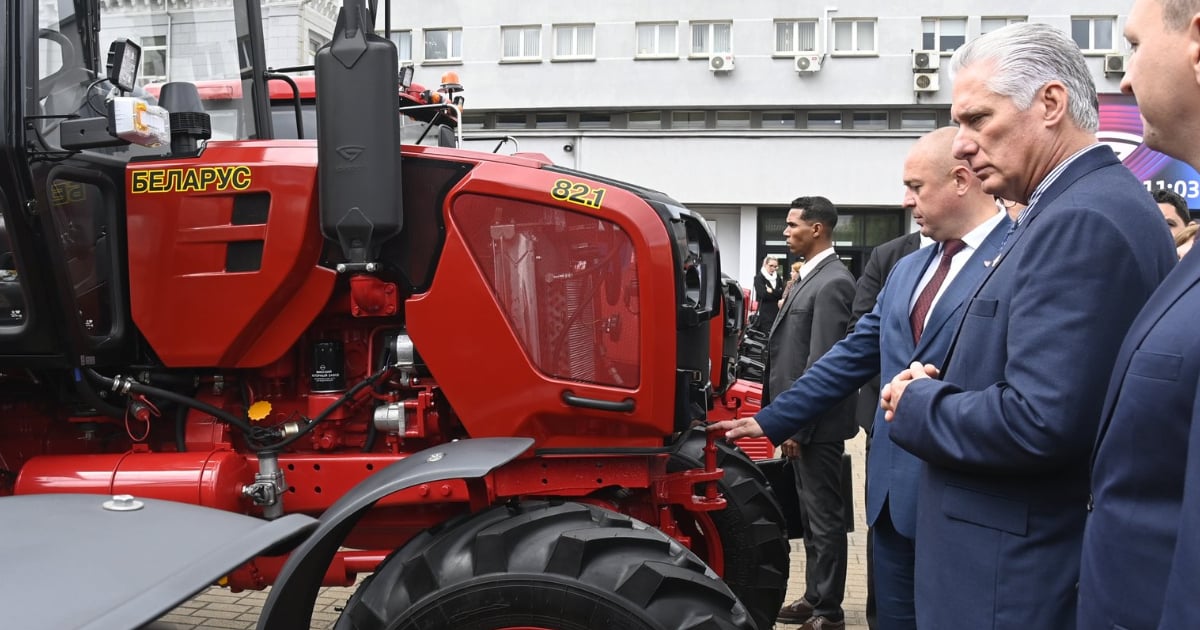A Belarusian tractor factory has promised to supply at least 50 units of agricultural machinery to Cuba by the end of 2025, amid the serious economic crisis facing the island and the challenges in the agricultural sector to ensure basic food supplies.
The promise was made during an official visit by Cuban leader Miguel Díaz-Canel to the Minsk Tractor Plant (MTZ), in the context of his tour of Belarus. According to the factory’s general director, Serguéi Avramenko, “this year we plan to supply at least 50 finished equipment units.”
Cuba, which has been a traditional market for this crop since the Soviet era, continues to use machinery that is over half a century old. “Currently, we are using equipment from our production that is 30, 40, and 50 years old. This demonstrates its quality and reliability,” said Avramenko, in statements reported by the Belarusian state agency BelTa. Nevertheless, this fact also reveals the serious technological stagnation faced by the Caribbean country in key sectors such as agriculture.
The Twitter/X account of the Presidency of Cuba added that the leader toured an exhibition of industrial machinery and noted that “currently, 12 modern Belarus 321 m tractors have been assembled in Cuba, and another 42 will be assembled soon”, highlighting the agreement as part of a joint effort to revitalize the national agricultural sector.
In a context marked by food shortages, the deterioration of agricultural infrastructure, and the massive exodus from rural areas to cities or abroad, the delivery of 50 tractors, while valuable, proves inadequate given the scale of the problem.
The supply is not only limited, but some of this equipment could be used in non-agricultural sectors, such as construction or the forestry industry, according to the explanation provided by the Belarusian official.
“The President recognized the very high quality of Belarusian equipment and noted that Cuba is open to continue working together”, tweeted @PresidenciaCuba. For his part, Foreign Minister Bruno Rodríguez Parrilla described the assembly of tractors on the island as “essential” for the “advancement of agriculture.”
But in the Cuban fields, it’s not just about machinery: without fuel, fertilizers, spare parts, or the minimal conditions needed to produce and transport, a new tractor can end up as immobile as the old ones that sit rusted along the edges of the furrows.
In exchange for what?
In recent years, the exchange between both regimes has been conducted under “mutual compensation” schemes, where Cuba does not pay with money but rather with products such as medicines, rum, or coffee.
In 2021, an agreement was signed to exchange Belarusian tractors and machinery for pharmaceuticals produced on the island, while in 2024, as confirmed by the media Plan B, the regime proposed to pay for a new batch of tractors with rum, cocoa beans, and coffee. All of this takes place in a context where Cuba is unable to sustain its own production of these products due to a lack of supplies and raw materials.
The barter arrangement, supported by agreements between state and private holdings from both countries, leaves many questions unanswered: what exact quantity of Cuban products will be delivered? At what price? Who manages them? Who oversees the process? The lack of transparency fuels suspicions of corruption, clientelism, and unequal distribution of benefits among governmental elites.
Even if the tractors arrive, what guarantees are there that they will end up in the hands of food-producing farmers, and not in the hands of military or exporting companies?
In January 2021, the government announced the sale of tractors in freely convertible currency (MLC) through state stores. A farmer from the capital said at that time that the prices ranged from 14,000 to 27,000 USD, which were unaffordable for most rural residents.
Frequently Asked Questions about Belarus’s Promise to Supply Tractors to Cuba
Belarus has promised to supply at least 50 tractors to Cuba in 2025. This promise was made during the official visit of Cuban leader Miguel Díaz-Canel to the Minsk Tractor Plant. However, given Cuba’s severe economic crisis and technological obsolescence, this number may be insufficient to address the problems in the agricultural sector on the island.
Payment for the tractors is made through barter, exchanging Cuban products such as medicines, rum, or coffee. This method has been used in previous agreements between Cuba and Belarus, reflecting Cuba’s lack of liquid financial resources to pay in cash for the tractors and other imported products.
The challenges include a lack of fuel, fertilizers, spare parts, and minimal conditions for production and transportation. Although tractors represent a technological improvement, without these critical inputs, their effectiveness and utility in the Cuban agricultural sector could be severely limited. Additionally, there is a risk that some tractors may be diverted to non-agricultural sectors.
The energy crisis in Cuba, characterized by prolonged power outages, exacerbates the situation in the agricultural sector. Without a reliable electricity supply, agricultural operations are disrupted, making it difficult to produce and preserve food. Additionally, the lack of electricity paralyzes the machinery and infrastructure necessary for the processing and transportation of agricultural products.
Díaz-Canel’s visit strengthens international alliances, but does not relieve the internal crisis. While he aims to enhance relationships and economic agreements with Belarus, the Cuban population continues to face a severe energy and economic crisis. The lack of tangible improvements in the daily lives of Cubans is generating increasing social discontent and skepticism regarding the real benefits of these international alliances.
